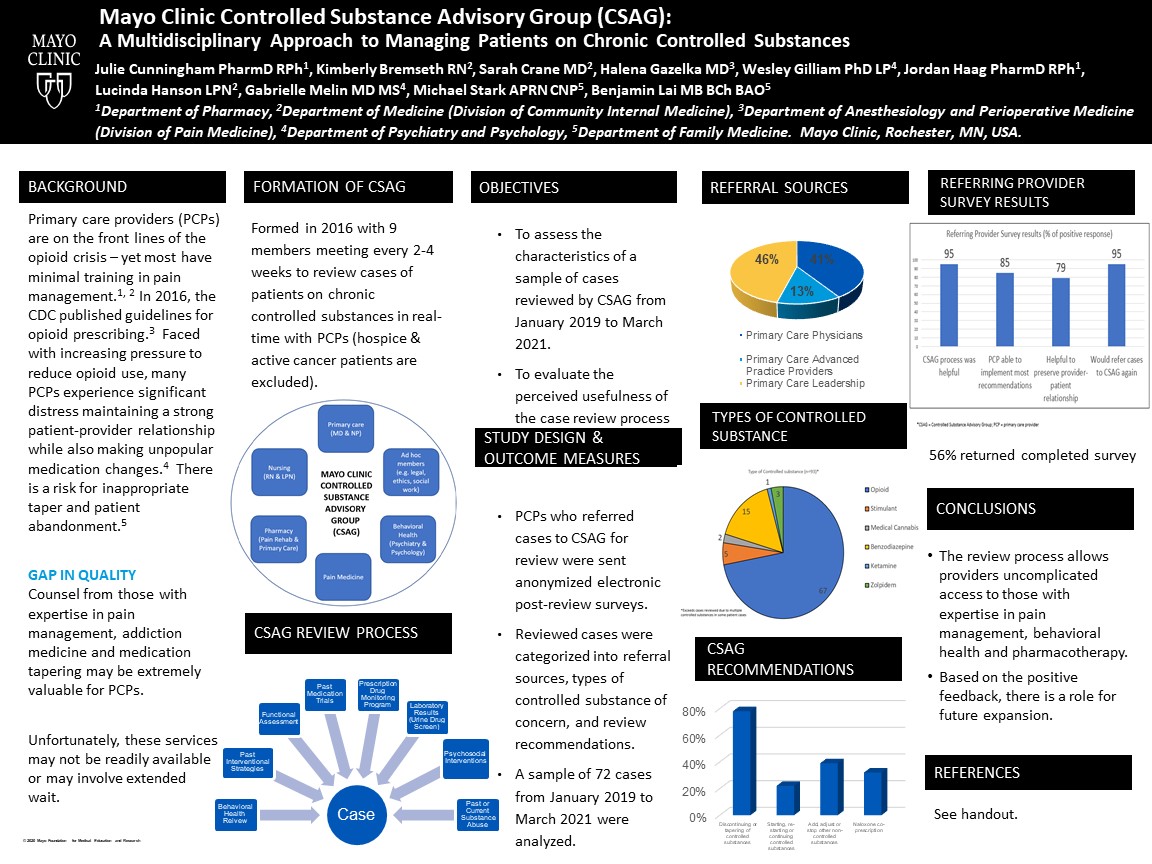PCR036: Mayo Controlled Substance Advisory Group: A multidisciplinary approach to managing patients on chronic controlled substances
Julie Cunningham, PharmD, BCPP; Kim Bremseth; Sarah Crane, MD; halena gazelka, MD; Wesley Gilliam, PhD; Jordan Haag, PharmD; Lucinda Hanson, LPN; Gabrielle Melin, ms; Mike Stark, NP; Benjamin Lai, MD, FAAFP
Abstract
Context: Primary care providers are on the front line of the opioid crisis attempting to appropriately prescribe opioids and provide compassionate care. Providers are in a difficult position and often need the counsel from those in pain management, addiction medicine and medication tapering. This has led to the development of a multidisciplinary Controlled Substance Advisory Group (CSAG) in 2016 at our institution comprising 9 members: 5 from primary care (2 clinicians, 1 pharmacist, 2 nurses); 1 pain specialist; 1 psychiatrist; and 2 pain rehabilitation providers (1 psychologist, 1 pharmacist). Having an outside group review cases and provide recommendations allows providers to preserve their relationship with patients. Objectives: (1) To assess the characteristics of a sample of cases reviewed by CSAG from January 2019 to March 2021 (2) To evaluate the perceived usefulness of the case review process. Study Design: Retrospective review of referred cases. Surveys were sent to referring providers after the review. Setting: Primary care clinics within Mayo Clinic and Mayo Clinic Health Systems in Minnesota. Population: Patients on controlled substances not in hospice and without an active cancer diagnosis. Post-review surveys were sent to referring providers. Intervention: Referring providers are invited to a real-time case review. Recommendations are entered into patients’ health records. Providers are asked to complete an anonymized post-review survey. Outcome measures: Cases reviewed categorized into referral sources, types of controlled substance of concern, and review recommendations; feedback from referring providers. Results: A sample of 72 cases from January 2019 to March 2021 were analyzed: 41% referrals came from physicians, 13% from advanced practice providers, 46% from practice leadership. 94% cases included opioids. Recommendations for 78% of cases included discontinuation/tapering; in the remaining 22%, CSAG recommended starting, re-starting, or continuing a controlled substance. CSAG provided recommendations regarding non-controlled adjuncts in 39% of cases. In 32% of cases, CSAG recommended naloxone. 85% referring providers were able to implement most of the recommendations, 79% reported that the review was helpful in preserving provider-patient relationship, 95% would refer cases again and would recommend CSAG to colleagues. Conclusions: CSAG allows providers to have easier access to specialists while preserving relationship with patients.

Jack Westfall
jwestfall@aafp.org 11/20/2021Great poster and abstract. Thanks